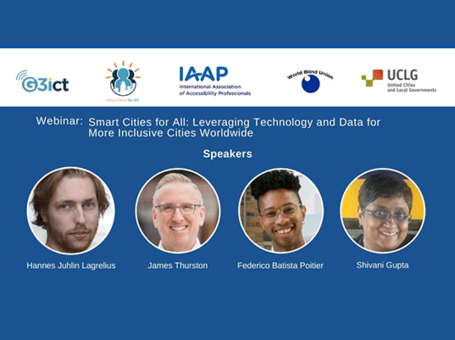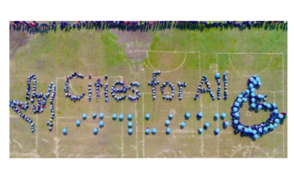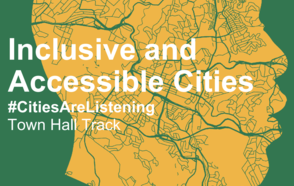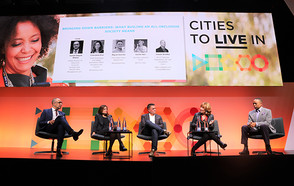
With the priority to accelerate the implementation of the 2030 Agenda, and harness the transformations from digitalization to reduce inequalities in cities- the World Blind Union hosted, in close partnership with UCLG, G3ict and IAAP, the webinar on Smart Cities for All: Leveraging Technology and Data for More Inclusive Cities Worldwide.
The discussions were held in the context of the follow-up of the TownHall process to enhance the constituency’s partnership with key stakeholders, and was moderated by Hannes Lagrelius, Program Officer for Accessibility in Smart Cities Initiatives of the World Blind Union, whom opened the webinar by thanking the partners for their collaboration and the participants.
Framing the human rights imperative for disability inclusion Shivani Gupti, Founder of AccessAbility India, started the discussions through the lens of the UN Convention on the Rights of Persons with Disabilities and the paradigm shift that the Convention had in changing perceptions of persons with disabilities as active constituents in the realization of their rights. The Convention, ratified by 181 countries, was the first human rights instruments to address access to technology as a human right.
Continuing the discussion Federico Batista Poitier, Policy Officer at UCLG, highlighted the essential role of local and regional governments in bridging the equity gap for persons with disabilities and working closely with civil society to develop policies to combat and reduce inequalities in cities. Building on the commitments to accessibility and disability inclusion within the New Urban Agenda, Federico further mentioned the strategic co-creation process that UCLG engaged in with civil society through the Town Halls during the World Summit of Local and Regional Governments. The Town Halls were spaces for dialogue between organized civil society constituencies and the political leadership of the local and regional governments constituency, to jointly define our global policies. From the key policy priorities developed, the policy paper on inclusive and accessible cities lays out a set of clear recommendations forward for local and regional governments to address and implement inclusive urban policies and programs.
The final presentation by James Thurston, Vice President for Global Strategy and Development at G3ict, highlighted the leading edge that smart cities have and how transformative the digital technologies are and will be in cities. In this growing market, that by 2025 will represent a 2.5 trillion-dollars, persons with disabilities are key stakeholders; yet technology is not accessible enough to include them in digital transformations. James further mentioned that although there exist digital accessibility standards and benefits for all through accessible technology, a G3ict global survey of 250 technology experts found that 60% of the experts believed that smart cities were failing persons with disabilities. In addition, only 18% of them knew of any smart city projects that were using accessibility standards. James concluded on the importance that accessibility has in the delivery of city services; particularly in the areas of mobility, emergency response and preparedness, citizen engagement, digital payments, and justice. Recognizing this opportunity for inclusion, G3ict and World Enabled have developed the Smart Cities for All Toolkit, which provides a set of tools that are currently being utilized by cities to improve their capacity to implement and develop accessible smart city policies and programs to leave no one behind.
To build on the outcomes from this discussion, UCLG is exploring with the Coalition on Digital Rights a specific webinar with learnings from the cities that have utilized the Smart Cities for All tools in their smart cities strategies. In addition, UCLG is following up on the policy recommendations from the Town Hall on inclusive and accessible cities, and working strategically on the establishment of a Community of Practice on Accessible Cities.
Please find the link to the webinar here













